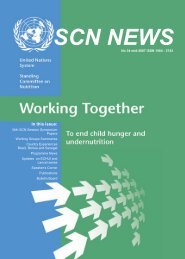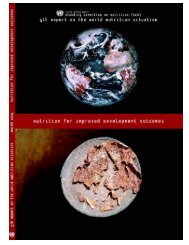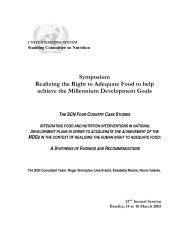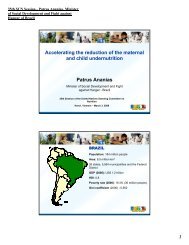Universal Salt Iodization (USI) - FTP Directory Listing
Universal Salt Iodization (USI) - FTP Directory Listing
Universal Salt Iodization (USI) - FTP Directory Listing
- No tags were found...
You also want an ePaper? Increase the reach of your titles
YUMPU automatically turns print PDFs into web optimized ePapers that Google loves.
80PUBLICATIONSwww.unsystem.org/scnEssentials of Human Nutrition: Third EditionMann J, Truswell S (eds)This book is designed as an introductory tonutrition science and practice for students,health providers, fitness instructors or anyonewho wants to learn more about nutrition.It emphasizes that nutritional scienceencompasses a spectrum of disciplines andinvolves the use of many methodologies.The chapters are written by leading internationalexperts who have been asked tofocus on what they think are the essentials in their respectivefields. The chapters are organized into 8 parts: energy andmacronutrients, organic and inorganic essential nutrients, nutritionrelated disorders, foods, nutritional assessment, life stages,clinical and public health, and special case studies. This bookcan certainly contribute to improved understanding and practiceof human nutrition across a range of professions whose formaltraining may not include much nutrition. www.oup.comAgricultural Trade Liberalizationand the Least Developed CountriesKoning N, Pinstrup-Andersen P (eds)Although the current round of internationaltrade negotiations was called a DevelopmentRound, very little was accomplishedbefore the negotiations stalled in mid-2006.Developing countries as a group stand togain very substantially from trade reform inagricultural commodities. It is less clear howthe 50 countries identified by the UN as‘Least Developed Countries’ (LDCs), which have been subject tospecial consideration in international trade negotiations, wouldfare. Would they lose their preferential trade access to theOECD markets and, if so, would these losses exceed the potentialgains from liberalized trade? Or would low-income countriesthat currently receive high prices for commodities such as sugarin some OECD-country markets be out-competed by countriessuch as Brazil in a liberalized market? More generally, wouldany benefits from liberalized agricultural trade be captured bymiddle-income countries with good domestic infrastructure andwell-functioning markets, leaving few or no economic benefits tothe LDCs? www.springer.comSchool Health, Nutrition, and Education for All:Levelling the Playing FieldJukes MCH, Drake LJ, Bundy DAPThis book is aimed at a wide audience;from policy-makers to implementers. Itdraws on the latest evidence in the field ofschool health and nutrition to introduce thecomplexity and scale of the school, healthand nutrition issues preventing nationsfrom fulfilling the promise of Education forAll. The authors affirm that to reach the six goals agreed in the2000 Dakar Framework for Action, it is mandatory to improvechildren’s health and nutrition. The book examines: Challengesto the health and nutrition of school age children; health andnutrition issues relating to access to education, including issuesof enrolment, drop-out and absenteeism; the long-term effects ofearly childhood illness on educational achievement; the evidencethat children’s learning suffers from poor health and nutritionwhile they are at school; and the costs and benefits of implementingschool health and nutrition programmes. www.cabi.orgPublic Health Nutrition: From principles to practiceLawrence M, Worsley T (eds)A systematic, research-based overview ofthe central principles and practice issues inthe growing field of public health nutrition.With chapters by leading international experts,this is essential reading for practitionersand students in public health, nutrition,health policy and related fields.www.allenandunwin.comEthics, Hunger and GlobalizationPinstrup-Andersen P, Sandøe P (eds)This book adds an ethics dimension to thedebate and research about poverty, hunger,and globalization. Outstanding scholars andpractitioners from several disciplines discusswhat action is needed for ethics toplay a bigger role in action by governments,civil society, and the private sector to reducepoverty and hunger within the contextof globalization. The book concludes thatmuch of the rhetoric by policy makers is not followed up withappropriate action, and discusses the role of ethics in attemptsto match action with rhetoric. The book also concludes that abetter understanding of the values underlying both public andprivate sector action towards the alleviation of poverty and hungerwould lead to more enlightened policies and greater successin attempts to achieve the Millennium Development Goals. Theinteraction between ethical, economic, and policy aspects isdiscussed and scholars and experienced practitioners from severaldisciplines suggest how such integration may be promoted.www.springer.comDietary fibre components and functionsSalovaara H, Gates F, Tenkanen MDietary fibre is of interest to both scienceand industry, and yet despite growingawareness of its benefits to health and nutrition,intakes remain below the recommendedlevel. This book is essential readingfor all researchers and those who concernthemselves with bioprocesses andfood technology. 'Dietary fibre componentsand functions' aims to cover the most up-to-date research availableon dietary fibre and is a useful tool for all scientists involvedin research and development in this field.www.wageningenacademic.comNutrition at a GlanceBarasi MNutrition at a Glance continues the popularseries style of providing succinct informationin a user-friendly and well illustratedformat. A resource for students in need ofan introduction to the area or a revisiontool, this book will also serves as a handyquick reference for busy professionals.www.blackwellpublishing.comSCN NEWS # 35 back to contents







